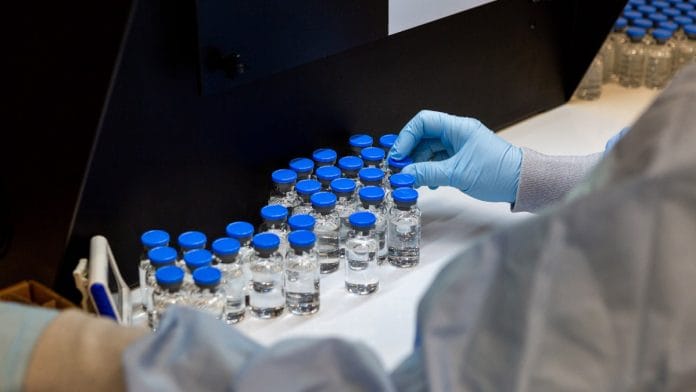New Delhi: The final results of a study funded by the National Institute of Allergy and Infectious Diseases (NIAD), in the US, has concluded that a 10-day course of the antiviral drug remdesivir is better than placebo in the treatment of hospitalised Covid-19 patients.
The results, published in the New England Journal of Medicine Thursday, come just weeks after WHO’s Solidarity Trial said remdesivir and three other drugs appeared to have little or no effect on hospitalised Covid-19 patients.
However, the NIAD study’s data suggested that their remdesivir treatment protocol may have prevented the progression of a more severe respiratory disease.
This was shown by “the lower proportion of serious adverse events due to respiratory failure among patients in the remdesivir group, as well as a lower incidence of new oxygen use among patients who were not receiving oxygen at enrollment and a lower proportion of patients needing higher levels of respiratory support during the study,” the researchers wrote.
“Treatment with remdesivir was associated with fewer days of subsequent oxygen use for patients receiving oxygen at enrollment and shorter subsequent duration of mechanical ventilation or ECMO for those receiving these interventions at enrollment,” they added.
Also read: Approved by US, rejected by WHO — science of remdesivir & why it has turned controversial
The study
The study was a double-blind, randomised and placebo-controlled trial with 1,062 patients.
Of the 1,062 patients, 541 were administered with remdesivir while 521 were given placebo.
Those who received remdesivir had a median recovery time of 10 days, compared to 15 days among those who received placebo.
However, the drug, which acts by stopping viral replication in the body, has no effect on mortality, the study researchers wrote.
“Given high mortality despite the use of remdesivir, it is clear that treatment with an antiviral drug alone is not likely to be sufficient for all patients. Current strategies are evaluating remdesivir in combination with modifiers of the immune response,” they noted.
The interim results of this trial had been published earlier in the same journal.
Also read: India’s Covid R value steady at 0.88, but many states see rise in infection rates
Solidarity Trial rejection and Gilead’s defence
On 15 October, a pre-print paper on the findings of the Solidarity Trial revealed: “These Remdesivir, Hydroxychloroquine, Lopinavir and Interferon regimens appeared to have little or no effect on hospitalized COVID-19, as indicated by overall mortality, initiation of ventilation and duration of hospital stay.”
The interim results of the NIAD trial was then cited by US pharmaceutical firm Gilead Sciences, which develops the antiviral drug, when it questioned the Solidarity Trial’s conclusions, in a statement.
The company had said, “The emerging data appear inconsistent with more robust evidence from multiple randomized, controlled studies published in peer-reviewed journals validating the clinical benefit of Veklury (remdesivir).”
The drug continues to be a part of the Covid management protocol in India as an “investigational therapy” for moderate cases (those on oxygen), and it continues to be used widely among patients.
Also read: Covid-appropriate behaviour key to fighting virus till vaccine arrives, says Harsh Vardhan






